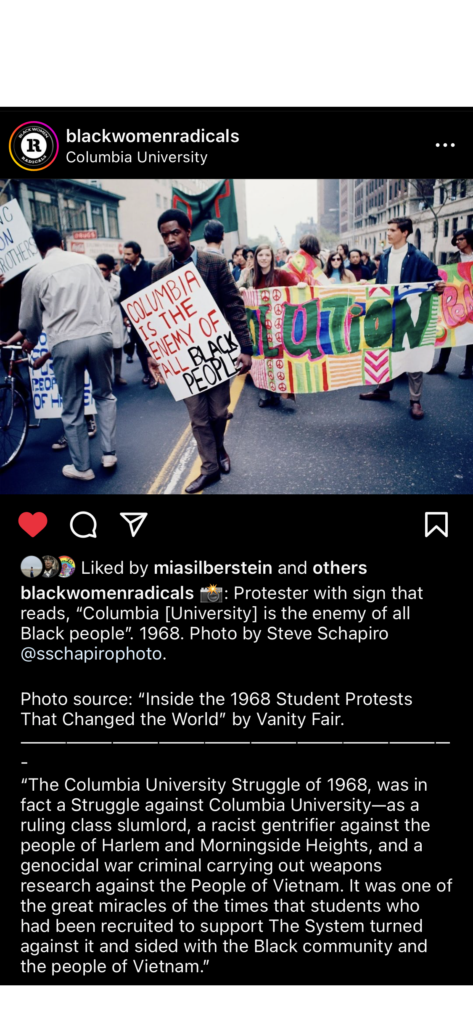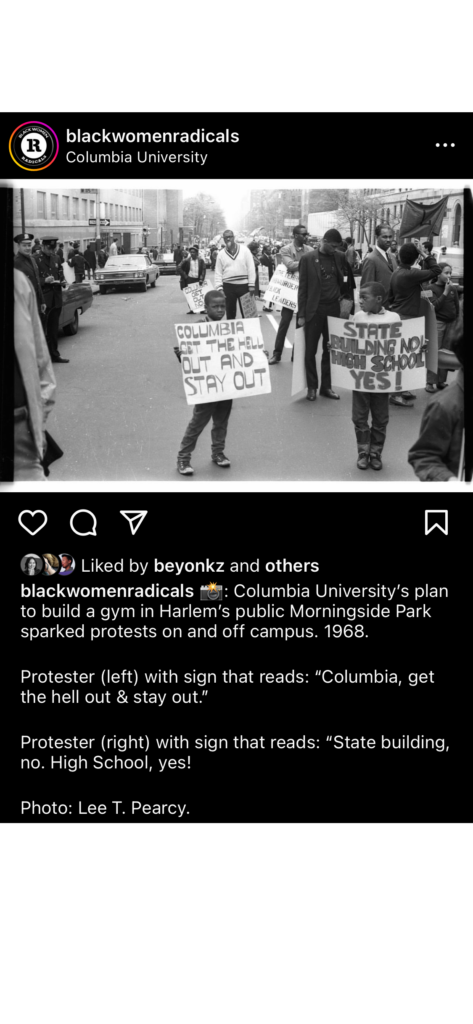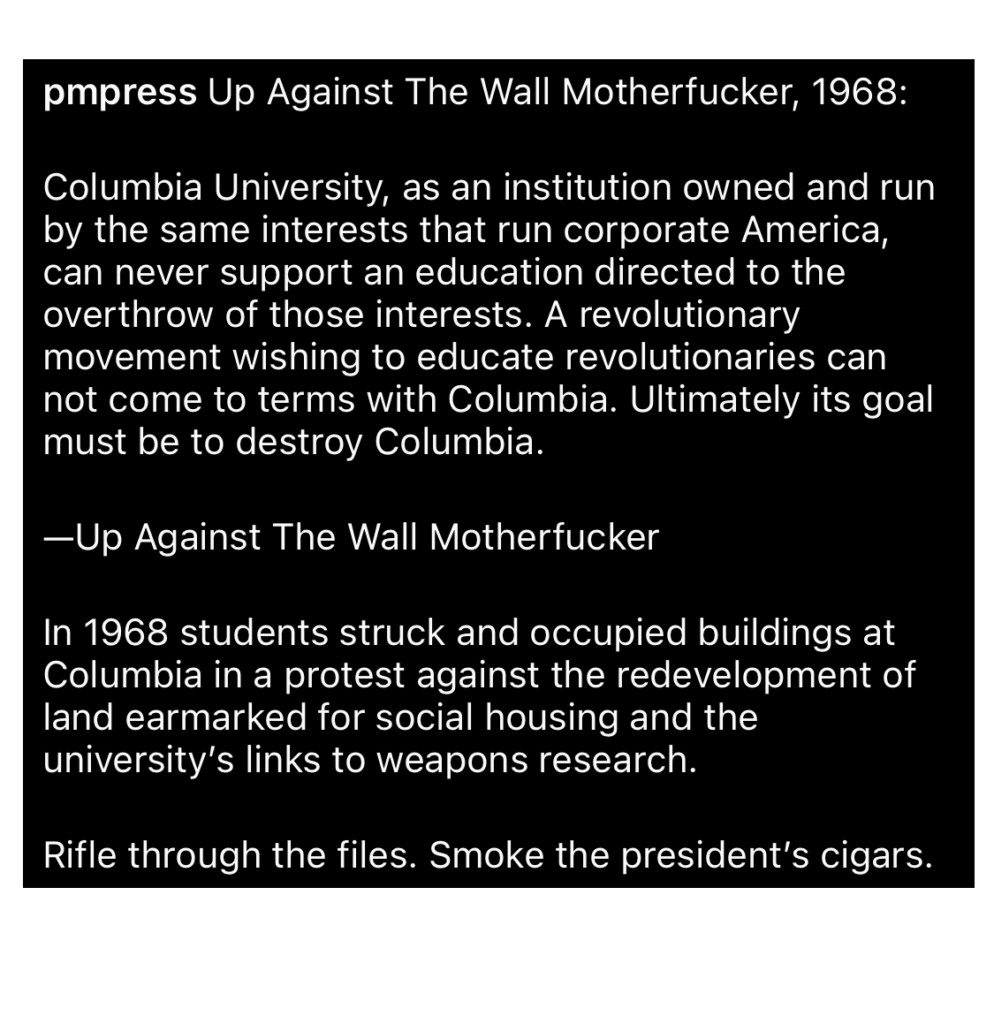“I realized that regardless of the tragedy, regardless of the grief, regardless of the monstrous challenge, Some of Us Have Not Died. Some of us did not die… and what shall We do, We Who Did Not Die?”
June Jordan, during her keynote lecture at Barnard College for the 30th anniversary conference for the Barnard Center for Research on Women, Nov. 9, 2001.


images from @blackwomenradicals on Instagram, displaying 1968 protests against a Columbia-proposed, gentrifying bid for a gym in Morningside Park (dubbed "gym crow" by students and Harlem residents). Protests coincided with student pressure for the administration to divest from and denounce the Vietnam War (several professors and affiliates worked with US military weapons dealers), and culminated in the occupation of several buildings.
Questions to consider that this essay will not answer:
- If I am angered or confused why students are protesting, what can I do to learn more about the history of student protest that led us here?
- If I am uncomfortable with protesters using violence as a tactic against militarized police, why am I centering my feelings right now, over those willing to be harmed for a greater cause against global, state-sanctioned oppression?
- If I’m most worried about the rise in anti-Semitism, especially at these college encampments, what can I do to educate myself about the fallacy of equating Zionism (a settler colonialist ideology and campaign) with Judaism (an ethno-religious identity and culture)?
- Are there anti-Zionist, pro-Palestinian groups in my area I can support through monetary or mutual aid means, before offering suggestions, commentary, or verbal commendation?
- If I’m a parent of college-age students, how can I talk to them about what’s going on and emphasize support for their dissent? If my children are younger, how can I talk to them about this as not a moment, but a movement?
- If I haven’t spoken out for a Free Palestine until now, why am I ignoring the legacy of oppression and the interrelatedness of all struggles, thus contributing to the continuation of the Empire?
- What can I do in my community to encourage more actions AND dialogues about BDS, and de-centering Israel’s control over our local, state, and federal governments?
- How can I center Disability Justice as I continue learning, talking about, and advocating for a Free Palestine among other global struggles?
This week, university students around the country made headlines as they took defiant stances against their institutions in support of ending the genocide on Gaza. There is much to be said about the activism of Columbia students and the history of encampments in general, but as a Columbia University student who left because of my disabilities, I am keenly aware of how we are leaving disabled people behind in our organizing for liberation.
Of course, I am enraged by institutions for not acting in the empathetic interests of true education and social advancement, but as someone with experience with marginalization (I’m a poor disabled asian trans dyke), it’s safe to say these colonial institutions were never what I had the most faith in.
I am angry, too, with the students of Columbia University and those reporting on their “occupation,” as there’s been a myopic, US-centered self-interested, anti-globalist shift in our conversations and a concerning lack of access in our organizing.
Though actual student protestors at Columbia have released clear and necessary statements against the co-optation of the movement for Palestinian liberation, I feel it necessary to explain my simultaneous disappointment in the profound display of “solidarity” made by students, faculty, and allies. Like many terms of the movement from “mutual aid” to “intersectionality,” the solidarity we are witnessing, I believe, has the potential to be disingenuous, misleading, and even deceptive.
My current disappointment stems, in part, with the faculty, students, speakers, and panelists who have boycotted and protested as “allies to Columbia students.” To ally oneself with privileged students who receive one of the most financially impressive and elitist educations in the world, is already red flag number one. My initial questions about the Columbia encampment grew to concern when I saw similar ones pop up at Yale and other selective schools in reaction to the CU administration’s collaborating with the NYPD and FBI to remove forcefully arrest and abuse their own students, as opposed to, you know, actual Gazan people, and indigenous people in general. This, of course, is all in the same week that we learned of hundreds of bodies in mass graves at Al Nasser hospital in Khan Younis. Bodies were found in horrific displays of the IDF’s brutality, with men, women, and children being treated for wounds found mutilated, beheaded, and even with organs missing. Recent coverage in Gaza mirrors that of the uncovering of mass graves of thousands of Indigenous children, who often died due to malnourishment, and physical and sexual abuse at boarding schools (forced-assimilation colonial camps) in both the U.S. and Canada.
Continued: on lack of Indigenous centering
In fact, the only college encampment I’ve seen thus far to address the needs for Indigenous solidarity and decolonization on a global scale has been Cal Poly Humboldt. Being that it’s a public university and has a high population of low-income, BIPOC students, this consciousness makes sense, but it’s still disappointing nonetheless that Indigenous sovereignty and decolonial practices isn’t at the forefront of this “occupation” movement in elitist spaces. I’m reminded of several modern and historic occupations by Indigenous people that clearly inspire the actions of student protests today, such as the 14-month occupation of Alcatraz as part of the American Indian Movement, one of many intersectional and often unmentioned key groups of the Civil Rights Movement, and Standing Rock.
Obviously, it’s important to take a stance against the Columbia administration for mobilizing the NYPD en-masse to arrest hundreds of students. But to stop there is to be missing the point of all the “work” we were supposed to have been doing since whenever we last woke up. To anyone who has been paying attention, Columbia’s allegiance with the police makes perfect sense. Columbia is the largest landowner in New York (they avoid paying almost $180 million in taxes every year while they poach and gentrify Harlem, Manhattanville, and Washington Heights). Like most if not all universities today, they are ultimately guided by money and capital, so their reluctance to give up lucrative, forthcoming ethnic cleansing investments through the Tel Aviv Center, Dual Degree Programs, and other cash crops, can only possibly be rescued by crying “terrorist!” on their own students. What’s most disappointing is the seemingly new and confusing circumstances my peers, teachers, and admin claim to be facing, despite me being the one who was too crazy to be a full-time student, and was subsequently forced to leave school in October. Did we all forget “the master’s tools will never dismantle the master’s house” or was that just a reading assignment y’all got chatGPT to write for you? (Lest us not forget the blatant exploitation and traumatization of Kenyan workers that went into creating chatGPT’s software, but I digress.)
Reading assignment!
This is a quote by Audre Lorde in her eponymous essay, which I highly recommend a (re)read at a time like this! https://collectiveliberation.org/wp-content/uploads/2013/01/Lorde_The_Masters_Tools.pdf
So let’s rewind. In my fall term of my sophomore year, at the beginning of October 2023, my partner and I were forced to leave Columbia University due to medical reasons and the school’s inability to accommodate our needs. After realizing we were putting our bodies through unimaginable trauma from neglecting our invisible disabilities, and then experiencing massive periods of burnout from academic stress, our needs could no longer be ignored. When we initially confronted our friends about changes in our lifestyle to support sensory, mobility, and learning needs, they thought that we demanded “too much change” from the school, and even from them. This was our last straw, and our first big push to reject the internalized ableism and White Supremacy Culture contributing to their responses. So we left.
In this scenario, I feel it necessary to call out those I once called my “peers,” alongside those who up until now have been silent about the calculated destruction of the Gazan people, but suddenly speak out against… what exactly? Is it that they’re surprised the institutions built by enslaved black people, who founded research that medicalized the madnesses of poor, queer, disabled, femme bodies of color, and created the most world-destroying nuclear technologies of human existence, those institutions are the ones *checks notes* criminalizing students? Well, I guess the folks who voted for the “Leopards eating peoples’ faces off” party are shocked to find their representatives are Leopards eating peoples’ faces off.
Nevertheless, I hope my criticisms are understood from a place of good faith. After all, we are our actions, and thus are ever changing. I hope for the better. My remaining friends at Barnard have told me of their beautiful experiences at the encampment and how hopeful they are for the learning and community displayed there. Of course, I’m writing this from a thousand miles away, where all I have is a screen to tell me, somewhere, it’s real. And it’s true. Something is coming.
I’ve seen videos of students rushing in to tarp and umbrella each other in the night as rainfall endures and the encampment floods. Circles of songs and drums on the lawns. Poem readings and discussions. Overtaking admittance week and encouraging admitted students to participate in the encampments events and speaking engagements. This is a time of learning and organizing in the face of grave adversity among largely first-gen, low-income BIPOC students suspended, evicted, and unhoused by their school, given only 15 minutes to collect their stuff, and then banned from campus, dorms, buildings, classrooms, and even dining halls. The stream of love, respect, and student/teacher/alumni fostering is courageous, if not incredibly brave. The CU encampment has adopted the language of “we take care of us” to reject the university’s total denial of responsibility over barely-minted adults.
They will not spectacle-ize us.
Especially as advocates for hate use this moment for personal gain (where Zionists, in the form of literal IDF officers, white women seeking cause for weaponizing their tears, and even the Proud Boys founder are allowed on Columbia’s Campus for a photo-op), it’s necessary to keep centering Gaza.
I’m simultaneously frustrated, envious, and inspired to see Columbia students’ ongoing encampment, along with a revitalizing outpour of community support, immense disturbances to neoliberal desires for “business as usual,” and the ripple-effect of recognition felt nationwide and globally. Finally, the world is not silent! (But is the spotlight so good?)
I’m fighting the urge to look to my not-so-unique circumstance for “what if”s. I am envious and inspired because I wonder what possibilities there could be, had I not listened to my body and stayed. If I was physically able to be there: contribute, sit, volunteer, listen, and mourn in community. To get involved in campus organizing as I had intended before being rushed home for months of prolonged (and ongoing) isolation. If I was physically able to expose myself to the sensory overload of putting my body on the line, through music and sirens and noise, through crowds and crowds of masked (and many unmasked people). If I was financially able to have stayed as a part-time student, instead of jumping ship entirely. With the rush of what-if’s, they often lead to other more unsolvable, untenable questions. What if I had received the gender affirming care I was promised from Columbia’s health plan, instead of months of delays from understaffed healthcare professionals serving over 20k students? What if I could have attended classes virtually when my panic attacks and dissociation were so violent I couldn’t leave my dorm? The questions lead nowhere, except back to pitying my own displacement rather than recognizing the shared feelings of truncated time with the students of Gaza, the students of Sudan, of Congo, of Tigray. Anywhere kids are grown by the time they lose a loved one or a limb. Until I recognize that’s what our oppression is meant to do—isolate and fearmonger, police, compete, disable—I cannot reject that pedagogy. I am thankful for my disabling because it reminds me of my shared humanity, my smallness, and my very big feelings.
Nevertheless, what am I supposed to feel as someone forced out of this very community, both by ableist social support and institutional demands for optimization, productivity, and, without fail, academic excellence? What am I supposed to feel as I see videos across social media of known-predators, white men with indie sleaze mustaches who are proud of their diverse music tastes (and friend groups), singing along on their “occupied” pristine campus lawns to anti-indigenous anthems like “This Land Is Your Land” by Woody Guthrie? (I can’t hear this song without thinking of when Jennifer Lopez performed it for Joe Biden’s Inauguration. If you’re not a fan of American Nationalism, you’ve been warned.) As mentioned, statements have been made by key Pro-Palestinian groups on campus, like SJP, about the denouncement of these virtue signaling individuals, yet where, if any, is the centering of the indigenous Lenape People alongside the indigenous Gazans they divest for? How, especially, can we use social media as a tool for strategizing and organizing, a tactic long-used by disabled and house-bound individuals, while simultaneously making participation in the movement inaccessible unless we can individually show up?
Though my issues with Columbia are valid and not by any means unique, I am tired because, I know, as a disabled person with mobility and sensory needs, I likely would be pushed out or invisibilized by this very moment. And, as you may recall, disability is an oppression that can occur at any time, so every issue is a disability issue. Thus, a movement that leaves us behind can never truly be liberatory.
May we learn from one another in this time of momentum, and may all walls fall.

from Up Against the Wall Motherfucker, 1968
"Columbia University, as an institution owned and run by the same interests that run corporate America, can never support an education directed to the overthrow of those interests. A revolutionary movement wishing to educate revolutionaries can not come to terms with Columbia. Ultimately its goal must be to destroy Columbia.
References/recommendations for doing more research and staying updated:
- Instagram: there are MANY on-the-ground activists, journalists, organizers, writers, artists, and community members but here are just a handful who have recently posted about college encampments for Gaza, abolition, police encounters, and how to support Palestinian liberation.
- Essays:
- Ismatu Gwendolyn’s “to Columbia’s undergraduates (and students everywhere): HOLD THE LINE.”
- Books:
- I highly recommend checking out Verso’s Reading List for Free Palestine!
